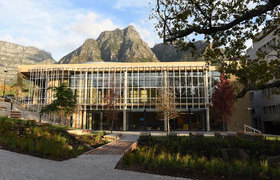Redefining purpose at this year’s Future of Education Summit
02 August 2021 | Story Stephen Langtry. Photo Je’nine May. Read time 5 min.
The University of Cape Town Graduate School of Business (UCT GSB) partnered with CNBC Africa and Forbes Africa as a key sponsor* of the seventh annual Future of Education Summit. The event, which took place on Thursday, 29 July 2021, was hosted online for the second consecutive year due to the COVID‑19 pandemic.
Within the theme “Redefining the Purpose of Education”, educators from 25 countries across the world considered whether education needed to be redefined during the pandemic and beyond, and to what extent. They also discussed whether education still meets the skills requirements of the 21st century.
UCT GSB’s director, Dr Catherine Duggan, participated in a panel discussion on ‘Closing the Skills Gap and Building Capacity – The 21st Century Curriculum’. Earlier in the day, UCT Vice-Chancellor Professor Mamokgethi Phakeng participated in another panel discussion, ‘The Purpose of Education in the 21st Century’.
The event began with a welcome address by Rakesh Wahi, founder of the Future of Education Summit and co‑founder of the ABN Group. In his address, Wahi referred to the devastation of the pandemic in India. He said, “The scars will heal but memories of this suffering will remain entrenched in the hearts and minds of people all over the world.”
“Youth face roughly double the unemployment rates of adults.”
Wahi indicated that one‑third of African youth between 15 and 35 were unemployed and that another third were “vulnerably” employed. The pandemic has also further compounded overall unemployment across the world.
“Youth face roughly double the unemployment rates of adults,” he said.
Wahi added that families are making significant investments in education that “might not ensure sustainable employment”.
During the panel discussion on ‘The Purpose of Education in the 21st Century’, panellists explored the reasoning behind educating young people. The reason, historically and at present, is to meet the labour needs of industry and economic needs of societies. Consequently, it is industry that determines the nature and focus of educational systems. The panellists noted that the purpose of education is to help people reach their potential, to teach people how to learn and equip them for lifelong learning, and to develop people into citizens and workers who can contribute to society.
Closing the skills gap
The panel, which addressed ‘Closing the Skills Gap and Building Capacity – The 21st Century Curriculum’, confronted the reality that sub‑Saharan Africa is coming up short in truly addressing the skills gap.
The inability of many businesses to pivot to digital training solutions during the COVID‑19 pandemic has resulted in delays in skills development and knowledge transfer, which, in turn, had a negative impact on operations and growth potential.
“Our problem is not a university problem; our problem is an education problem from preschool, through primary and high school.”
This discussion was moderated by Fifi Peters, a CNBC Africa news anchor. The panellists were Will Fan (co-founder and chief executive officer of NewCampus Singapore), Dr Duggan, and Sean Lewis, manager for Asset Lifecycle Management at Vodacom.
Lewis, who is also a UCT GSB alumnus and lecturer, said the problem of closing the skills gap is too big for the government to solve on its own.
“Our problem is not a university problem; our problem is an education problem from preschool, through primary and high school.”
Lewis pointed out that about 83% of South Africa’s learning population are in economically deprived schools with poor infrastructure, 90% of students have little access to internet connectivity, and 70% of learners do not have access to devices they need to connect to the internet for education. The government does not have the capacity to manage this challenge on its own and as such, industry needs to invest materially.
Dr Duggan emphasised that continuous learning should not be ignored as it is critical to close the gap between those who are looking for employment, and employers who struggle to find suitably qualified candidates.
“Across the continent, what we’re really looking for is an opportunity to upskill people at all ages and at all stages of their careers,” said Duggan.
*Joining UCT GSB as key sponsors of the event were Vodacom Business, Eiffel Corp, the University of Johannesburg, Vuma, Transnational Academic Group, Lancaster University of Ghana and Curtin University Dubai.
 This work is licensed under a Creative Commons Attribution-NoDerivatives 4.0 International License.
This work is licensed under a Creative Commons Attribution-NoDerivatives 4.0 International License.
Please view the republishing articles page for more information.










